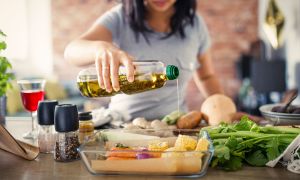Advertisement
When it comes to nutrient loss from cooking, the main foods that are affected are fruit and vegetables. (Meat and other proteins need to be cooked, and their mineral content stays intact. They also need to get hot enough to destroy microbes.)
Heat diminishes vitamins and phytonutrients (beneficial plant compounds other than vitamins or minerals) in fruits and vegetables. The longer they cook, and the higher the temperature, the greater the nutrient destruction. Even chopping food can begin to erode some of the nutrients. (So it’s best to eat foods soon after chopping.)
However, when it comes to certain phytonutrients, chopping and cooking actually makes these phytonutrients easier for our bodies to absorb. For example, light cooking enhances absorption of carotenoids (found in tomatoes, butternut and other winter squash, and dark green leafy vegetables and herbs, like parsley, spinach and kale) and isothiocyanates (found in cruciferous vegetables like broccoli, Brussels sprouts, and cabbage.)
For example, you absorb more of the carotenoid lycopene, a powerful antioxidant from spaghetti sauce than from raw tomatoes. Chopping broccoli and other cruciferous vegetables releases their cancer-fighting isothiocyanates, and lightly cooking furthers the process. (But too much cooking destroys the compounds.)
Bottom line: it’s fine to cook vegetables, just keep the cooking time to about 5 minutes if possible and use moderate heat.
Heat diminishes vitamins and phytonutrients (beneficial plant compounds other than vitamins or minerals) in fruits and vegetables. The longer they cook, and the higher the temperature, the greater the nutrient destruction. Even chopping food can begin to erode some of the nutrients. (So it’s best to eat foods soon after chopping.)
However, when it comes to certain phytonutrients, chopping and cooking actually makes these phytonutrients easier for our bodies to absorb. For example, light cooking enhances absorption of carotenoids (found in tomatoes, butternut and other winter squash, and dark green leafy vegetables and herbs, like parsley, spinach and kale) and isothiocyanates (found in cruciferous vegetables like broccoli, Brussels sprouts, and cabbage.)
For example, you absorb more of the carotenoid lycopene, a powerful antioxidant from spaghetti sauce than from raw tomatoes. Chopping broccoli and other cruciferous vegetables releases their cancer-fighting isothiocyanates, and lightly cooking furthers the process. (But too much cooking destroys the compounds.)
Bottom line: it’s fine to cook vegetables, just keep the cooking time to about 5 minutes if possible and use moderate heat.
Continue Learning about Cooking & Health
Important: This content reflects information from various individuals and organizations and may offer alternative or opposing points of view. It should not be used for medical advice, diagnosis or treatment. As always, you should consult with your healthcare provider about your specific health needs.


